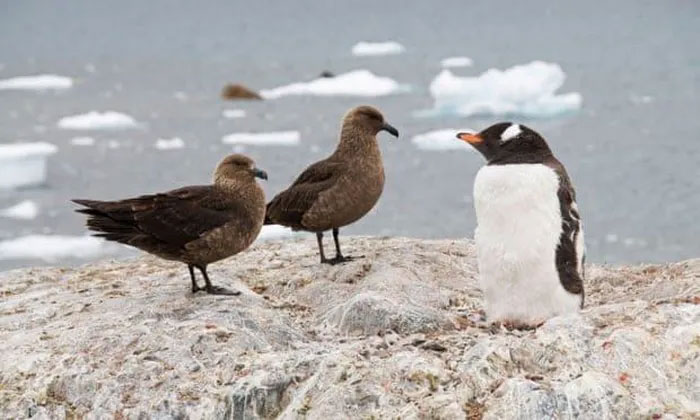First case of bird flu infection detected in the Antarctic region
Scientists have long feared the risk of the worst outbreak of highly pathogenic avian influenza (HPAI) in history in Antarctica, the main breeding ground for many bird species.
British experts discovered the first case of avian influenza virus infection in the Antarctic region, raising concerns that this highly virulent virus could be a threat to penguins and other animals here.

Skua seabirds and penguins in Antarctica. (Source: The Guardian).
The British Antarctic Survey said it had taken samples from brown skua seabirds after they died on Bird Island in South Georgia, a British overseas territory on the eastern tip of South America and south of South Georgia. North of the main landmass of Antarctica.
Samples sent to the UK for testing all tested positive for avian influenza virus.
The agency believes that the most likely source of the disease is migratory birds on the return journey from migration to South America - where a large number of birds infected with avian influenza virus have been recorded.
Scientists have long feared the risk of the worst outbreak of highly pathogenic avian influenza (HPAI) in history in Antarctica, the main breeding ground for many bird species.
Since mid-2021, large-scale outbreaks began spreading south to previously unaffected areas including South America, leading to mass deaths of wild birds and thousands of Tens of millions of poultry were destroyed.
Cases of bird flu in humans are very rare, and cases of illness are usually caused by direct contact with infected poultry.
In early October, Cambodia recorded the death of 2 children due to bird flu. This is the third death due to bird flu recorded in this country this year.
The virus is increasingly being detected in mammals, raising concerns that the virus could mutate into a version that is more easily transmitted from person to person.
- Spain detected bird flu
- The first case of H7N9 influenza infection was detected from humans
- Taiwan detected the first case of H7N9 infection
- Hong Kong discovered more cases of the 6th flu H7N9
- Bird flu is complicated in Asia
- China detected new cases of bird flu
- Poland: detected the fifth bird flu outbreak
- The only case from H7N9 flu is by taking Tamiflu
- Risk of infection with H5N1 bird flu from bird nest
- The giant bird once dominated the Antarctic sky 50 million years ago
- Malaysia announced the first case of H7N9 influenza virus infection
- Rounding out the announcement of the bird flu epidemic infected with H5N1
 March 2012: Launching H5N1 vaccine for poultry
March 2012: Launching H5N1 vaccine for poultry Experts comment on the mysterious gradual disappearance of the Delta variant in Japan
Experts comment on the mysterious gradual disappearance of the Delta variant in Japan Danger of the two Delta . branch variants
Danger of the two Delta . branch variants 2020 pandemic flu attack humans?
2020 pandemic flu attack humans? More confirmation about alien life world captured by NASA
More confirmation about alien life world captured by NASA  Top Chinese space scientist says Indian spacecraft did not land on Moon's south pole
Top Chinese space scientist says Indian spacecraft did not land on Moon's south pole  Discovery of new carnivorous dinosaur fossils in Argentina
Discovery of new carnivorous dinosaur fossils in Argentina  Colombia discovered giant turtle fossils dating back 57 million years ago
Colombia discovered giant turtle fossils dating back 57 million years ago  South African cobra swallows poisonous snakes
South African cobra swallows poisonous snakes  Bird flu alarm in South Africa
Bird flu alarm in South Africa 